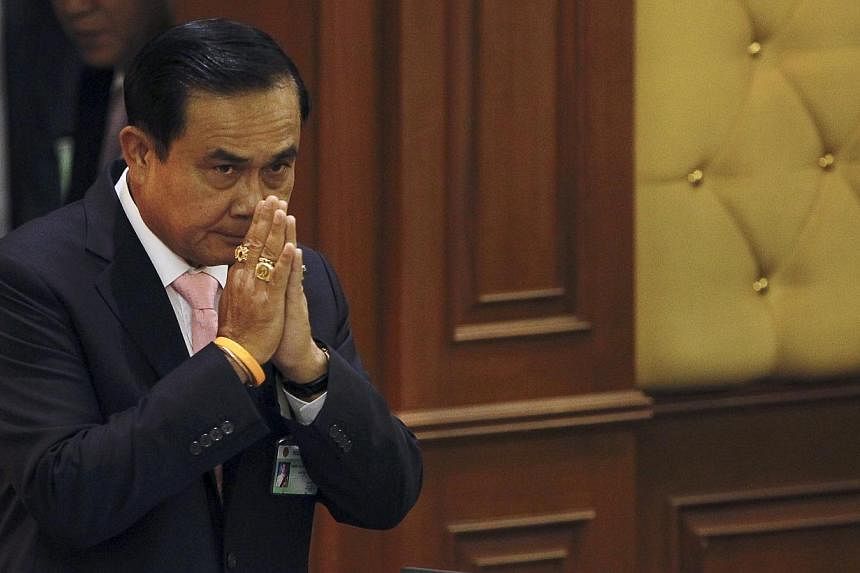It's been one year since Thailand's military took over the reins of the government on May 22 after more than six months of street protests against former Prime Minister Yingluck Shinawatra.
Here's a quick look at the current situation in Thailand and what lies ahead:
Interim constitution
The military rulers enacted an interim Constitution in July last year, two months after the military coup. The charter gave the junta oversight of a hand-picked legislative assembly as well as amnesty for staging their May 22 coup, among other things.
Article 44 grants coup leader and Prime Minister Prayut Chan-ocha absolute power as junta chief. This allows him to override the executive, judiciary and legislative branches of the government to protect national security and promote reform.
This means that even after martial law was repealed in April this year - some 10 months after it was imposed - political controls in Thailand had not loosened. Those deemed a threat to national security would still be tried in military courts, and soldiers would still be able to detain people without an arrest warrant
Addressing criticism of these broad powers, Gen Prayut said: "There's no need to be afraid. If you don't do anything wrong, why should you be afraid?"
Rewriting of Constitution
Meantime, work is underway to rewrite the Constitution which the military leaders say is necessary to soothe the country's caustic divides ahead of next year's election. But the effort is widely seen as an assault on the electoral success of the former ruling Shinawatra clan. Parties led by or aligned to Thaksin Shinawatra's billionaire family have won every election since 2001, prompting two coups backed by the royalist establishment and nearly a decade of acrimony that has frequently led to violence.
Mr Borwornsak Uwanno, chairman of the drafting committee, said the new Charter "will not allow a majority government which can become a parliamentary dictatorship". He denied it was "a blueprint" to end the domination of the Shinawatras, saying it would instead empower the Thai people.
Under the draft, future elections will be decided by a proportional representation system similar to that of Germany, which will favour smaller parties and coalition governments. But to avoid legislative paralysis under coalitions, prime ministers will not have to be directly elected by the public.
Lawmakers will also be barred from becoming ministers, raising the prospect of unelected officials running the government.
The Thai cabinet has agreed that a referendum should be held on the new constitution before the election, thereby delaying the polls.
Election delayed
The election has been postponed by at least six months to August 2016, raising questions about a promised return to democracy.
"It will take place around August or in September," said Deputy Prime Minister Wissanu Krea-ngam. The government had initially said voting would take place in February 2016.
Since taking power, the junta has come under domestic and international pressure to hold elections, which they say can only take place under a new constitution.
Critics say politics are simply put on hold under a regime that bans political gatherings, and that divisions remain as sharp as ever. They point out that the blueprint for Thailand in a new draft constitution is an attempt by Gen Prayut and the powers that back him to prevent a comeback by Mr Thaksin and his allies.
Thaksin this week broke his silence on the junta that removed the remnants of his sister Yingluck's government from office. Its first year in power was "not so impressive", he said, but he had no plans to mobilise his "Red Shirt" supporters.
Slow economic growth
Gross domestic product barely grew last quarter from the previous three months, and Thailand has downgraded growth forecasts by 0.5 percentage points to 3.0 to 4.0 per cent for the year. But the central bank has said even a 3-per-cent expansion would be "a challenge".
While the benchmark SET Index has risen 8.8 per cent, Morgan Stanley predicts that the gains will not last as the outlook for the economy and corporate earnings worsens, while UBS Group AG has cut its position on the nation's stocks from "neutral" to " underweight".
Despite hopes that the military government would unleash a splurge of infrastructure spending, state investment has failed to keep pace even with the levels the paralysed government of a year ago managed, partly because bureaucrats fear an anti-graft drive by the junta.
Domestic consumption is hobbled as households are saddled with record-high debt and the export-driven economy is suffering as its biggest trade partner China grows at its slowest pace in 25 years.
"Expectations were high when the military took over that they could kick-start spending quickly, but this has been difficult with the government's focus (rightly or wrongly) on constitutional reform," said Bill Diviney, an economist at Barclays in Singapore.
"On hindsight, perhaps it was unrealistic to expect so much of a government that, for all intents and purposes, is a caretaker until democracy is restored."
Clampdown on dissent
Known for his abrupt manner and impulsive remarks, Gen Prayut launched a crackdown on dissenters after seizing power last May. Human Rights Watch said hundreds of people, including activists, journalists and politicians, have been arrested since the coup.
In January, the junta forced a German foundation to cancel a forum on press freedom, saying Thailand was at a sensitive juncture.
SOURCES: REUTERS, BLOOMBERG, AGENCE FRANCE-PRESSE

